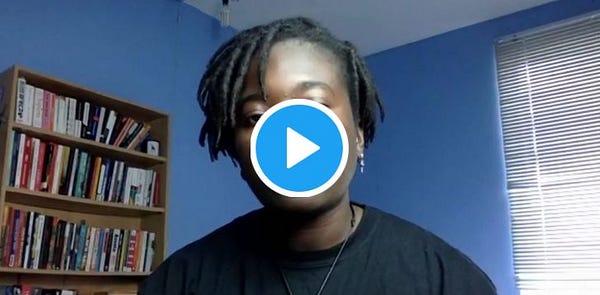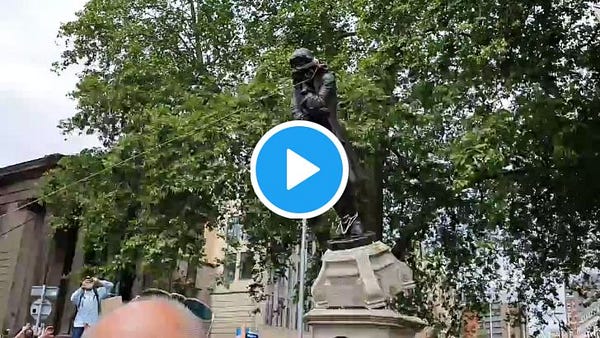#8. Black voices, white responses, and transitional justice.
"Believe me, we are never sad enough for the world to be better."
FYI, this newsletter contains a lot about racism, both present and historical, as well as some references to other atrocities from history.


(The original version of this newsletter contained a shorter version of the above)


It's possible to view history as a string of conflicts, disasters, and atrocities. Wars and counterwars, punctuated by uneasy ceasefires. If we can just go long enough without fighting, the theory goes, we might be able to move on.
But there is another view — that history is the long hard process of reconciliation, punctuated by moments of desperate relapse and disappointment.
If you've ever been in any sort of close relationship, you'll know personally that while hurt can be quick, reconciliation can take orders of magnitude longer. You'll know that that anger can be terrifying, apologies are not enough, forgiveness is not a given. That it can feel hopeless, like you can see no path forward, like the hardest thing you've ever done.
Both perspectives are important. Some of the worst atrocities in human history have been perpetrated by white cultures towards black. We might view recent history as the persistent refusal of white people and cultures to reckon with our own history, to listen, to try to make things right.
The righteous anger of black people is not new. But I have felt some ground shifting this week, in myself, my surroundings, and throughout the anglosphere — that we might be ready to start doing the work.
Corporate Antiracism
This arrived in my inbox this week:
As a leader who really cares, I feel the responsibility to not just talk about Diversity, Equity and Inclusion, but to make meaningful changes and contributions through my own actions and how we operate at 23andMe. Our management team, Board and employee base must have greater diversity. I am ashamed to say I do not have a single black employee who is at Director level or above. Our product is euro-centric but must expand to be inclusive and equitable. We absolutely have the potential to be better. Despite our efforts, I have to honestly say that we are also part of the problem.
I'm not sure what to call this, but it feels somehow new. The CEO of a company who sells a product where you send them some of your DNA and they analyse it to see where your ancestors might have lived is sending me an email telling me that their internal hiring and promotion practices are structurally racist, and that she is ashamed of this.
The email isn't bad exactly, but it is strange.
A few steps up on the coherence ladder was cofounder of the fairly dubious website Reddit, Alexis Ohanian:

I think a lot of white people are doing things like this. Wittgenstein said "That of which we cannot speak, we must pass over in silence." — but it no longer feels good enough. Instead, we get a sort of babyish gurgle. The beginning of articulate speech, and a necessary stage, but not yet recognisable as such.
Praytesting
Which might put this video into some sort of context:


No one really wants to claim this one, so it's sort of hard to find much on it, but from what I can surmise from the Daily Mail and RT (I know) this was a Christian church with black and white parishioners (and presumably others, but they don't appear) who split along those lines to do the above. So they already knew each other and essentially pre-planned it.
It's somewhat strange to watch, and seems to have genuinely divided opinion in the replies. But in this strange moment, in a Christian context, between those who know each other... you can sort of see what they're trying to do? The fuller RT video makes this much clearer, as the white man speaking says:
Use us to make a difference, raise up an army God, an army from your kingdom that will take action, that will get involved, that will become friends, that will become allies, that will become neighbours.
Police Abolitionism
I've never known the Overton window to shift this fast:
Government officials have long dismissed the idea as a leftist fantasy, but the recent unrest and massive budget shortfalls from the Covid-19 crisis appear to have inspired more mainstream recognition of the central arguments behind defunding.
“To see legislators who aren’t even necessarily on the left supporting at least a significant decrease in New York police department [NYPD] funding is really very encouraging,” Julia Salazar, a New York state senator and Democratic socialist, told the Guardian on Tuesday. “It feels a little bit surreal.” ~ Guardian
This feels like an idea whose time has come. I've seen people changing their minds(!) live this week. Now people are actually taking it seriously, they're asking the obvious questions like "What about murderers?" and "Won't companies hire large private security firms?" And meanwhile, prison and police abolitionists have been working for decades coming up with very reasonable answers to these questions. The UK police seem to be running a big PR campaign right now, which is interesting.
Curious as to what a world without cops would look like? Take a read of What a World Without Cops Would Look Like:
How do you mesh the idea of police abolition with the need to address serious public safety threats like murder or aggravated assault (when those crimes are committed by the general public)?
The criminal justice system says there’s one strategy for everything—make arrests, put them in prison. What abolitionists say is, Well, let’s figure out why they’re doing this and try to develop concrete prevention strategies. Not all homicides are the same. Is it a domestic violence case? Is it a school shooting? Is it a drug deal gone bad? We know, for instance, that in almost all the school shooting cases, somebody had a pretty good idea that this might happen , but did not tell anyone—or told the police and the police had no tools to do anything about it. What if instead, we had a system in place where when a young person thinks their friend might do something awful, can go and talk to a responsible adult without worrying that the police will get involved, that they will have ratted on their friend to the police, or that their friend will get expelled from school because of some zero tolerance policy?
It’s important to remember that there is no perfect world, there’s no perfect solution. What we have now is far from perfect. People get killed all the time, even though our society is filled with police. Can we come up with a situation where there are fewer killings, and fewer collateral consequences?
It doesn't need to be perfect, it just needs to be better than this. That doesn't feel too high a bar right now. For more insight into the spread of opinions, try reading A World Without Police, 8 Can't Wait, this Reuters article, and this tweet with comparisons of abolitionist vs reformist approaches.
I wonder if someone might be able to use some UKIP tactics on this one. Set up a very focused political party with substantial variances in geographic support, target electoral seats to split votes and pressure mainstream parties into making concessions. The prospect of splitting the left vote doesn't seem very appetising right now, but hey — worth considering.
Transitional Justice
How can our societies move forward from this?
There is a framework for this, and it's called Transitional Justice. It emerged out of post-WWII Europe and the German project of Vergangenheitsbewältigung ("working through the past").
I think British/American people usually consider this something Other Countries need, but... well you tell me if this fits:
From full blown national and international conflicts to repressive governments, ordinary people are very frequently the victims of abuses — and on a massive scale. Such violence may involve mass killings, forced disappearances, torture, rape, massive displacement, forced recruitment of children and myriad other crimes. It leaves societies devastated, with crumbling institutions that cannot serve its citizens and consequences lingering for generations. Transitional justice is about societies seeking to recover from such profound and systemic failure.
While the worldwide history of racism is both longer and more complicated than one war or government, the past wrongs have never properly been addressed, and social reform is very incomplete to the extent it has happened at all. We may be in the early stages of the largest, and longest, transitional justice process in world history.
If you want to get a clearer idea of what this might look like in a UK context, the closest parallel is probably the Northern Ireland Peace Process. Forgive me for putting him back on your screen, but David Cameron's apology on behalf of the UK government for Bloody Sunday is worth a watch. (If it helps, Labour set up the inquiry.)
That was just one moment in a long, still incomplete process. If it seems like an awful lot of work to you, and still with so much bitterness, it should give you some idea how long this is going to take and what kind of outcome we can realistically aim for. The ICTJ's take on this is worth quoting at length:
Hearing the impassioned calls for justice across the United States and around the world, we know from our experience that these calls are for something far more encompassing than criminal accountability alone, though that is an integral and necessary part of the response. Justice entails listening to the voices and demands of the victims and dismantling the structural inequalities and discrimination that allow violations to occur in the first place. Justice requires carrying out the necessary reforms of state institutions, such as the judiciary, law enforcement agencies, prisons, and education and health care systems, that reinforce and perpetuate such discrimination on a daily basis. Justice calls for a society to reckon with its legacy of past abuses, which in the United States involves acknowledging the ways in which oppression, racism, and discrimination have persisted for centuries. It also includes providing reparations for past harms to communities of color that have been fighting an uphill battle against entrenched and acute inequalities since the country’s founding. Most difficult of all, justice demands nothing short of a cultural transformation, in which the state acknowledges past wrongs, society at large engages in dialogue about them, and both take concrete steps toward a future where the human rights of all citizens are fully and equally upheld. In the United States, only this broadly conceived justice will finally put a period on the long list of victims’ names.
Read more on the ICTJ's What is Transitional Justice? page. I hope it gives you some resolve. It gives me some.
Edit, just as I was about to send. This is a start:


Now let’s make sure it stays down!
I almost thought I wouldn't send this one. It's not easy! If I seem authoritative at all, it’s not because I feel it (or am). Listening is important — most of the time I spend on these newsletters is reading rather than writing. But listening is also kind of easier than speaking. You can't be wrong by listening. But it's a small step from listening to passivity to silence, and we can't end up there again.
Faltering speech is better than silence (I think).
K
P.S. If you are white and you’re struggling with all this and want to work it through in conversation, please do feel free to hit reply. I’m not an expert but talking can help I think.
P.P.S. The subtitle is a quote from someone. I saw it in a JLG film.






